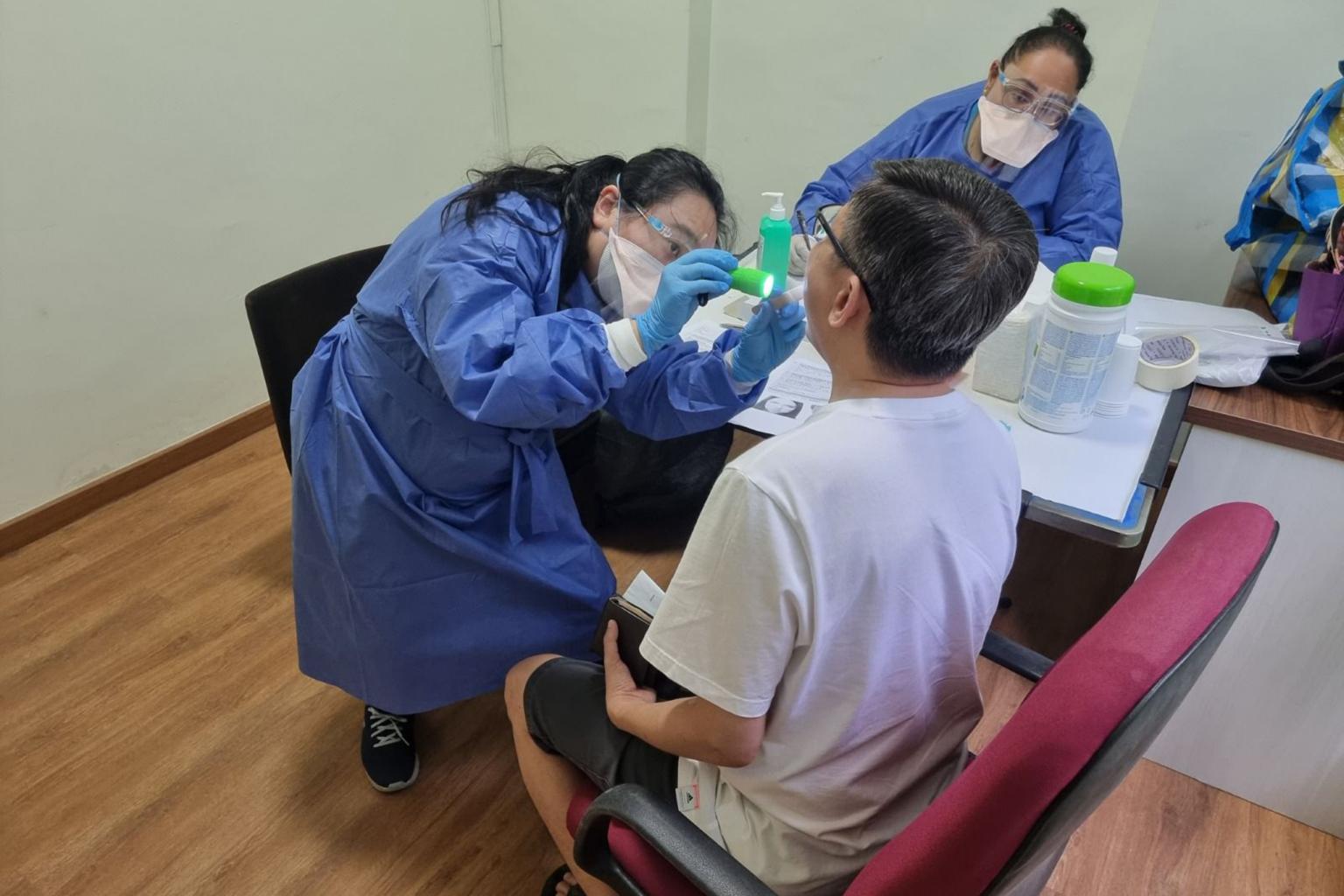Pilot that screens for missing teeth highlights need for preventive oral care
Sign up now: Get ST's newsletters delivered to your inbox

A nurse conducting an oral frailty screening at a neighbourhood senior activity centre under the Oral Health Movement 8020.
PHOTO: NDCS
SINGAPORE - For one in five Singaporeans above the age of 40, poor oral health has either affected his ability to chew, swallow or speak, or put him at risk of having chewing, swallowing or speech difficulties. Yet, most do not go for a follow-up.
These are the findings of an ongoing pilot by National Dental Centre Singapore (NDCS) that screens for oral frailty or a decline in oral function.
Called the Oral Health Movement 8020 or OHM8020, it is targeted at helping people aged 40 and above retain at least 20 of their natural teeth beyond the age of 80.
It is in line with the new national focus on preventive health called Healthier SG. The Ministry of Health launched the public consultation for this strategy on May 18. It will end on Aug 15.
Under OHM8020, 288 people were screened - the majority aged 60 and above - and it was found that 22 per cent or 64 of them were either orally frail or in the orally pre-frail state.
The group of 64 was invited to go for a comprehensive oral examination and oral frailty assessment conducted by a dental professional as part of NDCS' pilot intervention programme, but only 14 of them did so.
All except one discovered that they needed dental prostheses like dentures, while three were referred to speech therapists because of their swallowing issues.
Madam Lai Sow Fong, 73, a cleaner who has just five teeth left, was screened late last year and knows she should get dentures, but she has not done so.
"I am already so old and I don't have time anyway as I have to work six and a half days a week," she said in Mandarin.
Over the years, her teeth fell out one by one, especially when she was chewing food. "It's been many years and I can still eat meat with my five teeth, but I cannot eat peanuts," she said.
Madam Lai, who has four children and lives alone in a rental flat, enjoys communicating with her fellow workers. But she does not speak to strangers and does not smile much.
"I am afraid people will laugh at me for having so few teeth. There were times when people could not get certain words I said, so I don't dare to talk too much."
Dr Chan Pei Yuan, a consultant at NDCS' restorative dentistry department who leads the screening initiative, said the majority of residents screened by NDCS' community partners declined enrolment in the intervention programme due to mobility issues.
"Thus, the collaboration with primary care and community partners would be crucial to ensure the residents receive their much-needed care," she said.
The free screening programme is scheduled to end in November, but Dr Chan said NDCS wants to engage other partners to scale the study. NDCS is also in the midst of validating an oral frailty scale, which is a questionnaire that a layperson can use to assess if he is orally frail.
Being orally frail has been found to increase the risk of physical frailty, sarcopenia (an age-related loss of muscle mass), disability and mortality, said Dr Chan.
"A large proportion of the population visit the dentist only when there is pain, and by then, they may require extensive and expensive treatment like root canal treatment to restore their dentition," she said.
Dr Goh Siew Hor, the immediate past president of the Singapore Dental Association, said tooth loss not only affects one's chewing ability, but possibly also one's food choices and nutritional status.
"In some individuals, it may also have a psychosocial impact as they may be embarrassed by their appearance and therefore limit their social interaction and type of activities," he said.
The NDCS pilot attempts to identify those at risk of oral frailty and address oral disease and risk factors early on, but for it to have an impact on population health, such screening needs to be done at the community level by tapping dental general practitioners, Dr Goh said.
This is similar to activating the network of family physicians, he said.
"Educating other community service providers on possible signs of oral frailty and need for appropriate dental referrals can also be helpful in early identification of those who may be at risk of oral frailty."
Dr Goh, who is the head of clinical services at NTUC Health, said Project Silver Screen (PSS), Singapore's nationwide health screening regime for the elderly, already offers simple checks on the eyes, ears and mouth, and NTUC Health partners with the regional health systems to provide basic treatment and advice for the elderly in their mobile dental clinic.
However, PSS is only for those aged 60 and above, and some of them have already lost too many teeth to function well, while the NDCS initiative attempts to catch people just before they tip into oral frailty, he said.
To find out more about the initiative, you can write to ohm8020@ndcs.com.sg


